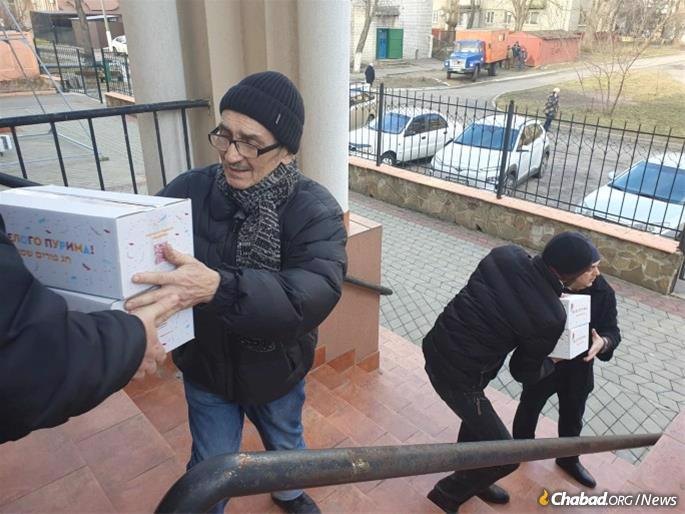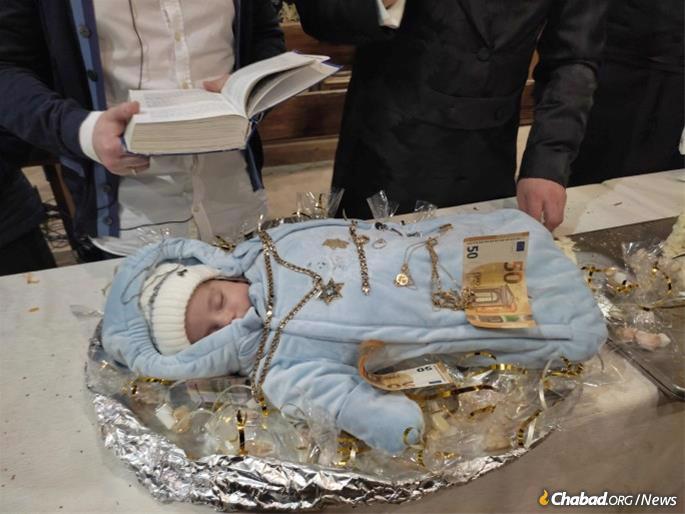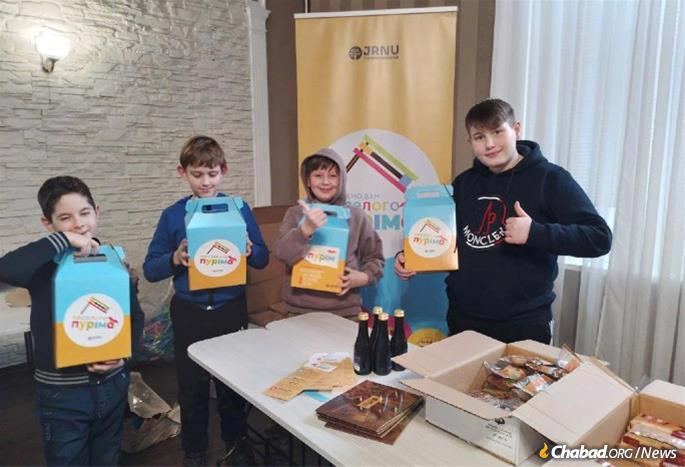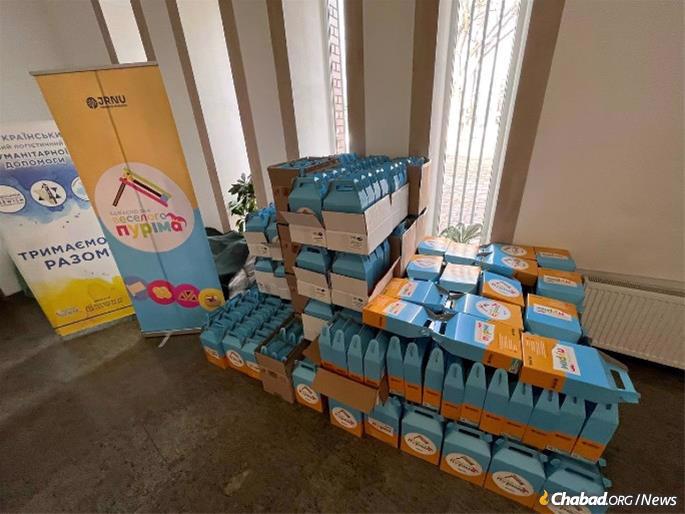|
Getting your Trinity Audio player ready...
|
By Mendel Super(Chabad.org)
Ukraine’s Jewish communities are expected to turn out in record numbers for joyous Purim celebrations this year as they look to their faith for joy and comfort amid the day-to-day stresses of the deadly, grinding war that has entered its second year.
In the months leading up to the holiday, the Chabad-Lubavitch center in Vinnitsa, directed by Rabbi Shaul and Chana Hadasa Horowitz, has been bustling. “The war has brought many Jews closer,” Horowitz tells Chabad.org. “We see more Jews coming to shul. They want to connect.”
Horowitz was thinking of renting a theater for the community Purim party, given the hundreds of people he’s expecting. But with continued attacks, he decided to host it in the relative safety of Chabad’s school building—the same building that has housed and fed thousands of refugees during the past year. One of those refugees, the rabbi noted, didn’t know anything about Judaism other than his maternal grandmother being Jewish. Now, he’s started wrapping tefillin every day. And the community just celebrated three circumcisions and three pidyon habens, the rite of symbolically redeeming a firstborn from a kohen.
Horowitz hopes that Purim, which begins on Monday night, March 6, and continues through Tuesday, March 7 (extending through Wednesday in Jerusalem), will bring some joy to a community ravaged by war for more than a year. He recounts that last week while visiting the nearby town of Mezhibuzh—home to the resting place of the holy Baal Shem Tov, the founder of the Chassidic movement—he saw several women from his community, crying and beseeching the holy tzaddik to intercede with G‑d and put an end to the war.
“Every day, we pray for this nightmare to be over. Seven hours every day we have no electricity,” said the rabbi. The school and Chabad center have generators, he notes, thanks to the efforts of the Jewish Relief Network Ukraine (JRNU), Chabad’s wartime unified effort for funding and providing humanitarian work in Ukraine. He describes the center as a place where people come simply to warm up and charge their phone, which has become a challenge even for successful business people.
In addition to life-saving support, the JRNU has provided beautiful Purim kits that are being distributed to tens of thousands of Jews across the country. The packages contain wine, mini-sweets, fresh hamentashen, an illustrated scroll of Esther (Megillat Esther), a colorful gragger (noisemaker), and a guide detailing the holiday customs and traditions. The boxes are being prepared and delivered by hundreds of volunteers at Chabad-Lubavitch centers around Ukraine.

‘Nobody Is Staying Home for Purim’
Closer to the front, in Kiev, Rabbi Mordechai Levenharts says the war won’t affect Purim. “This is our life now,” he sighs. “Nobody is staying home on Purim because of the war. This is normal life. We have morning services every day of the week.”
On Purim eve, Chabad is hosting their main Purim event, while the next day they will hold a seniors event and Megillah readings at the schools. All this, he adds, is done under constant air-raid sirens. They’ll also be sending thousands of mishloach manot packages throughout the city.
Despite a great number of community members fleeing Ukraine, Levenharts says many have remained and some have even returned. And with refugees from other cities converging on Kiev, he reports that big events, such as Purim, are busier than ever. “People feel a need to come and get a morale boost; they’re looking for this,” says the rabbi.

Further east, Rabbi Shlomo and Dina Salamon of Chabad-Lubavitch of Kremenchuk—a city in central Ukraine steeped in Chabad Chassidic history—are gearing up for a festive Purim meal for hundreds, with 1,000 mishloach manot being sent out in the days leading up to the holiday. He, too, reports that “people who never wanted to come before are now connecting with the community.”
The war, Salamon says, is “regular life.” The night before he spoke with Chabad.org, Kremenchuk was hit by several missiles. “There are no shelters. When I am at home, I go to the safest place—a room with no windows. People aren’t scared anymore; most sirens don’t end with a strike on Kremenchuk.”
For the past few days, he adds, they’ve had electricity, but there have been weeks with no power at all. Despite all that, he says people are beginning to come back.

Festive Party Planned for Orphans Returning Home
In fact, Chabad’s Mishpacha children’s home in Odessa just returned to Ukraine after a three-day bus ride from Berlin, where the children and staff spent the past year. When Mishpacha’s director, Chaya Wolff, who also runs Chabad of Odessa with her husband, Rabbi Avraham Wolff, spoke with Chabad.org last week, the buses were pulling up to the campus in just an hour. “It hasn’t been a simple journey at all,” she says of the past year, which saw her shuttling back and forth between Berlin and Odessa, and raising funds to care for the children in Germany.
Their community in Odessa still managed to function “as normal, just with extra humanitarian efforts,” she says. “But it wasn’t easy.”
They’ll be having a clown show for preschool-aged kids and an art event for older children on Monday. Afterwards, the entire community will gather at the synagogue for the Megillah reading, where they will all receive mishloach manot at the end. That night there will be another event for teenagers, and the next morning, they will have service at the synagogue and Megillah readings at the school before they take all the children to Legoland, a kid’s activity and games center.
Purim will culminate in Odessa with their annual farbrengen, a traditional Chassidic get-together where hundreds of people will celebrate the night away, says Wolff. “We hope people will rejoice,” she says, “and forget about the atmosphere around them—the war—and just feel the joy of the holiday.”
Donations to help the Jews of Ukraine can be made at the JRNU website.






